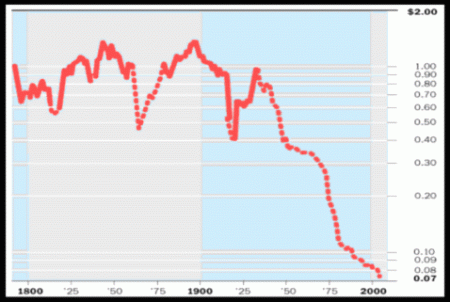Thursday, March 6, 2008
Destroying the US$ is not good policy
Inflation is always the greatest threat to prosperity.
by StFerdIII
There are consequences to debasing a currency and none of them are positive. US monetary policy is a conscious attempt to devalue its currency; increase exports and inflate the US economy out of the financial crisis precipitated by a fall in house prices. It is both an unnecessary and quite dangerous policy.
The reasons for the U$ decline are varied but at the core are 3 issues. First the US is printing too much money and interest rates are too low [3% in the US vs 5.25 % in the UK, and 4% in the EU]. Second, fiscal improvidence, entitlement programs and subsidies are leading to budget deficits. Third, higher returns are being realised outside the US and these returns are not U$ denominated.
The Americans can address all three issues – and they should. First the money supply is growing by more than 10% a year – far in excess of economic growth [about 3% in 2007 overall]; inflation [4.2%] and population growth. In fact is almost double. Second, non-essential and non-military spending is out of control increasing by at least 10% per year. Third, the Americans need to cut taxes and regulation to stimulate their economy, returns and foreign investment.
Over the past 30 years the dollar weighted index has fallen from 100 in 1974, to 60 in 2008. This is a dramatic 40 % drop in one generation. In 2001 the dollar index was at 110. In the past 5 years the dollar has dropped close to 40% and has fallen by 5% in the past month alone. This is simply an unsustainable dollar devaluation crisis. If not arrested it will herald the end of American hegemony and presages a huge inflationary run up.
The greatest threat to wealth is inflation. Inflation is a tax on consumers and wealth. As purchasing power declines wealth in all dollar denominated assets also decline. Incomes typically can't keep up with 4% plus inflation – at least not in the short term – so real wages fall. As wages fall in the short term the consumer part of the economy contracts.
Similar problems exist for business. As inflation increases raw material costs go up. Industrial commodity prices on every item are near or above historical records. Oil is now forecasted to rise to $150 as the US$ keeps falling. Any commodity or material priced in U$ must increase in value as the dollar is debased, leading to inflation and for many firms using the commodity as an input, lower profits.
The main beneficiaries of a declining dollar are exporters with a large based of buisness outside the US. They benefit from translating stronger currencies into the US$ and inflating revenues and profits. As well they can purchase in overseas markets commodities and raw materials with stronger currencies. Other beneficiaries of a declining US$ would be those holding assets in stronger currencies including the Euro, many of which were in marked decline against the US dollar a few short years ago.
So what does the declining U$ mean?
None of the consequences of a debased US currency are positive. At some point the international financial and reserve system will move out of U$ to the Euro. This will give the Europeans more financial, political and even economic importance, since the world reserve currency generates profits for the holder of that currency. The world currency owner can for example borrow at lower rates to finance deficits and increased consumption over investment.
Such a shift from the U$ to the Euro would have a profound impact on the US economy and on foreign affairs. Simply put the US would be far weaker, even militarily, if this were to occur. It would also occasion governments in the US to deal with out of control spending by either raising taxes; cutting spending; or borrowing at above market average rates. None of these would be beneficial to the US economy.
There is of course the matter of prestige and power. A weak currency reflects intellectually and superficially, a weak country. The richest empires in history have proven that a robust and reliable currency unit is mandatory in running, and managing a far-flung empire. The Roman denarii, the British pound, even the Franc and Ruble, all have demonstrated the benefits of imperial monetary domination.
Maintaining a strong currency and reassuring the empire's citizens of its reliability, is a must for the imperial power. Allies and satrapies don't take kindly to devaluating assets or using a weak imperial currency. In times past debased currencies and economic chaos has led to many a war and rebellion against a weak imperial power.
The dollar's decline is a symptom of imperial weakness. A dollar decline might benefit multi-national firms and exports; and decrease temporarily the trade deficit, but those benefits come at a huge cost. Inflation, rising oil and gold prices which are denominated in the U$, and most vitally, a decrease in hegemonic power, are the results of bad fiscal and monetary policy.
The U$ dollar's 30 year decline once again proves the folly of governmental and political posturing. Once the US dollar loses its status as the world's reserve currency, it will soon relinquish its imperial dominance. This is not a positive for anyone inside the US imperial system. Empires bring peace, prosperity and wealth creation. International economic chaos does not.